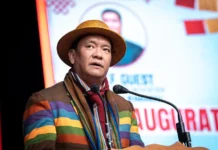NEW DELHI, 3 Nov: Showing unflinching support to anti-corruption agencies, Prime Minister Narendra Modi on Thursday said they “need not be defensive” while tackling graft, even when some people with “vested interests” keep hollering and maligning them.
Addressing the Vigilance Awareness Week organised by the Central Vigilance Commission (CVC), the prime minister exhorted the panel, other agencies and officers to ensure that the corrupt should not be spared, no matter how powerful the individual may be.
He said it is the responsibility of organisations like the CVC that no corrupt person gets “political or social refuge.”
“Every corrupt person should be held accountable by the society. It is important to build such an atmosphere. We are seeing that paeans are being sung for people already proven corrupt. People calling themselves honest do not feel the shame to go and get photographed with such corrupt people. This situation is not good for the Indian society,” he said.
Without taking any names, Modi said that people are glorifying corrupt people and advocating for awards to them.
“Agencies like CVC working against corrupt and corruption need not be defensive. If you are working for the welfare of the country, there is no need to live in guilt.
“We do not have work on a political agenda, but it is our duty to eradicate problems faced by the common man of the country. People with vested interests will holler, they will try to strangulate the institutions and try to defame dedicated people sitting in these institutions,” he said.
In his 24-minute speech, the prime minister also asked the vigilance community to think about modernising their audits and inspections.
“The will which the government is showing against corruption, the same will is necessary to be seen in all the departments. For a developed India, we have to devise such an administrative ecosystem which has zero tolerance on corruption,” he said.
Citing his own experience, Modi said that, during his long tenure as head of the government, he has gone through mudslinging and abuses, but “people stand with you when you walk on the path of honesty.”
He said that the legacy of corruption, exploitation and control over resources that the country got from long periods of colonialism continued post independence as well.
He said that eight years of his government has tried to change that by reforming the systems and introducing transparency.
Modi rued that such grassroots corruption affected the poor and the middle class, who spent all their energy in getting these facilities and benefits.
“We are trying to change this system created by scarcity and pressure, and fill the gap between demand and supply,” he said, listing out measures taken by his government during the last eight years, like direct benefit transfers, Government e-Marketplace, weeding out of fake beneficiaries from PDS, digital transactions, among others.
The prime minister said that reaching every eligible beneficiary of any government scheme and achieving the goals of saturation puts an end to discrimination in society while eliminating the scope of corruption.
He said too much dependence on foreign goods has also been a big cause of corruption.
Modi said all government agencies should work to change the system and tradition of corruption as India is celebrating 75 years of independence.
He said the country needs to have “zero tolerance” for corruption in the administrative ecosystem and this would work for the idea of a developed India.
The prime minister suggested that a ranking of government departments on anti-corruption efforts should be done and pending cases of corruption against officials decided in a time-bound mission mode.
He advocated continuous monitoring of criminal cases, devising a way of ranking departments on the basis of pending corruption cases, and publishing the related reports on a monthly or quarterly basis.
The prime minister also asked for streamlining the vigilance clearance process with the help of technology. There is a need for auditing the data of public grievances, so that we can go to the root causes of corruption in the department concerned, he added. (PTI)



